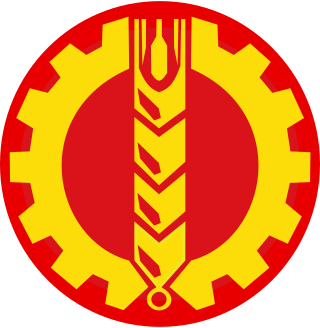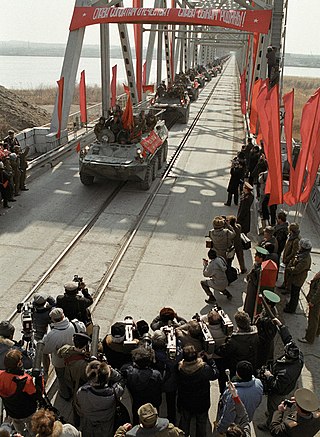
Babrak Karmal was an Afghan communist revolutionary and politician who was the leader of Afghanistan, serving in the post of general secretary of the People's Democratic Party of Afghanistan from 1979 to 1986.

Mohammad Najibullah Ahmadzai, commonly known as Dr. Najib, was an Afghan politician who served as the General Secretary of the People's Democratic Party of Afghanistan, the leader of the one-party ruling Republic of Afghanistan from 1986 to 1992 and as well as the President of Afghanistan from 1987 until his resignation in April 1992, shortly after which the mujahideen took over Kabul. After a failed attempt to flee to India, Najibullah remained in Kabul. He lived in the United Nations headquarters until his assassination during the Taliban's capture of Kabul.

The Democratic Republic of Afghanistan (DRA), renamed the Republic of Afghanistan in 1987, was the Afghan state during the one-party rule of the People's Democratic Party of Afghanistan (PDPA) from 1978 to 1992. It relied heavily on assistance from the Soviet Union for most of its existence, especially during the Soviet–Afghan War.

The Soviet–Afghan War was a protracted armed conflict fought in the Soviet-controlled Democratic Republic of Afghanistan (DRA) from 1979 to 1989. The war was a major conflict of the Cold War as it saw extensive fighting between the DRA, the Soviet Union and allied paramilitary groups against the Afghan mujahideen and their allied foreign fighters. While the mujahideen were backed by various countries and organizations, the majority of their support came from Pakistan, the United States, the United Kingdom, China, Iran, and the Arab states of the Persian Gulf. The involvement of the foreign powers made the war a proxy war between the United States and the Soviet Union. Combat took place throughout the 1980s, mostly in the Afghan countryside. The war resulted in the deaths of approximately 3,000,000 Afghans, while millions more fled from the country as refugees; most externally displaced Afghans sought refuge in Pakistan and in Iran. Approximately 6.5% to 11.5% of Afghanistan's erstwhile population of 13.5 million people is estimated to have been killed over the course of the conflict. The Soviet–Afghan War caused grave destruction throughout Afghanistan and has also been cited by scholars as a significant factor that contributed to the dissolution of the Soviet Union, formally ending the Cold War.

The People's Democratic Party of Afghanistan (PDPA) was a Marxist–Leninist political party in Afghanistan established on 1 January 1965. Four members of the party won seats in the 1965 Afghan parliamentary election, reduced to two seats in 1969, albeit both before parties were fully legal. For most of its existence, the party was split between the hardline Khalq and moderate Parcham factions, each of which claimed to represent the "true" PDPA.
The following lists events that happened during 1996 in Afghanistan.
The following lists events that happened during 1986 in Afghanistan.
The following lists events that happened during 1981 in Afghanistan.
The following lists events that happened during 1979 in Afghanistan.
The following lists events that happened during 1980 in Afghanistan.
The following lists events that happened during 1982 in Afghanistan.
The following lists events that happened during 1984 in Afghanistan.
The following lists events that happened during 1985 in Afghanistan.
The following lists events that happened during 1987 in Afghanistan.
The following lists events that happened during 1988 in Afghanistan.

Pursuant to the Geneva Accords of 14 April 1988, the Soviet Union conducted a total military withdrawal from Afghanistan between 15 May 1988 and 15 February 1989. Headed by the Soviet military officer Boris Gromov, the retreat of the 40th Army into the Union Republics of Central Asia formally brought the Soviet–Afghan War to a close after nearly a decade of fighting. It marked a significant development in the Afghan conflict, having served as the precursor event to the First Afghan Civil War.

The Afghan mujahideen were Islamist resistance militias that fought the Democratic Republic of Afghanistan and the Soviet Union during the Soviet–Afghan War and the subsequent First Afghan Civil War.
The sixth emergency special session of the United Nations General Assembly was held between 10 and 14 January 1980 to consider the situation in Afghanistan. As the Soviet–Afghan War began members of the United Nations General Assembly requested the Security Council consider the situation. The USSR veto of a resolution led the other members to invoke the 'Uniting for Peace' resolution to defer the issue to the General Assembly in an emergency special session. It was the sixth emergency special session since the 'Uniting for Peace' resolution was adopted in 1950. The session was dominated by questions of its legitimacy since the Afghanistan government had invited the Soviet intervention in their civil war. Led by the non-aligned members, the session ended with a resolution from the General Assembly calling for the immediate, unconditional and total withdrawal of foreign troops from Afghanistan and the cessation of all outside intervention, subversion, coercion or constraint, of any kind whatsoever, so that its people could freely choose its own economic, political and social systems.

The Democratic Republic of Afghanistan was the government of Afghanistan between 1978 and 1992. It was recognised diplomatically by only eight countries which were allies of the Soviet Union. It was ideologically close to and economically and militarily dependent on the Soviet Union, and was a major belligerent of the Afghan Civil War.

The Afghan conflict refers to the series of events that have kept Afghanistan in a near-continuous state of armed conflict since the 1970s. Early instability followed the collapse of the Kingdom of Afghanistan in the largely non-violent 1973 coup d'état, which deposed Afghan monarch Mohammad Zahir Shah in absentia, ending his 40-year-long reign. With the concurrent establishment of the Republic of Afghanistan, headed by Mohammad Daoud Khan, the country's relatively peaceful and stable period in modern history came to an end. However, all-out fighting did not erupt until after 1978, when the Saur Revolution violently overthrew Khan's government and established the Democratic Republic of Afghanistan. Subsequent unrest over the radical reforms that were being pushed by the then-ruling People's Democratic Party of Afghanistan (PDPA) led to unprecedented violence, prompting a large-scale pro-PDPA military intervention by the Soviet Union in 1979. In the ensuing Soviet–Afghan War, the anti-Soviet Afghan mujahideen received extensive support from Pakistan, the United States, and Saudi Arabia in a joint covert effort that was dubbed Operation Cyclone.









